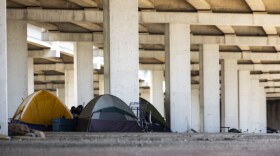The number of people experiencing homelessness in Austin hit a 10-year-high in 2020, according to a new report.
Data from the Ending Community Homelessness Coalition's point-in-time count show that 2,506 people were homeless on the night of the annual census, Jan. 25. More than half of those people – 1,574 – were on the street that night, an increase of 45% over last year.
ECHO attributes the increase to the city's paring down of shelter beds overall – opting to focus more on transitional housing – and to the fact that one of the the Salvation Army's shelters was closed that night because of a burst pipe.
As far as the overall number of homeless Austinites, ECHO says the city has seen a relatively unchanged growth rate per-capita over those 10 years.
The survey also showed small increases among populations that had been targeted for re-housing efforts – specifically black Austinites, veterans and young people. ECHO noted fewer people among those demographics sought services last year.
Other metrics stayed relatively in line with previous years.
Black Austinites are still overrepresented proportionately within the homeless community. While they make up roughly 8% of the city's population, 36.5% of those surveyed in January identified as black. Whites were also disproportionately represented, though not as much.
Quiana Fisher, a program manager at Caritas of Austin and co-chair of ECHO’s Racial Equity Task Group, said she hopes Austin more adequately addresses that overrepresentation.
"Where we put our energy is where we see movement," she said in a statement. "I would like to challenge us – service providers, decision makers, the community and system at large – not just to talk but to act, to move past the equality lens and move toward providing real equity in housing services.”
The survey also showed that most people experiencing homelessness in the area aren't here from out-of-state.
Most people told volunteers they first became homeless in Austin – 63%, a slight increase over 2018 – or in Texas –19.4%. Seventeen percent said they'd first experienced homelessness out of state.
The count capped off a politically charged year surrounding the issue.
In June 2019, the Austin City Council voted to essentially decriminalize camping and resting in public, which opponents argued made the downtown area less safe.
Mayor Steve Adler and other proponents of the decision argued it allowed people to become more visible. Opponents argued it led to more public health and safety issues in Central Austin and in other reaches of the city, as encampments cropped up following the decision.
The dispute triggered a back-and-forth over the issue between local and state leaders after Gov. Greg Abbott joined the discussion in October. Abbott threatened state intervention if the city didn't address public defecation and drug use, citing (sometimes incorrectly) evidence from social media.
The Austin City Council did eventually reinstate some bans on public camping and resting – specifically in the downtown area. A day later, Abbott ordered the Texas Department of Transportation to clear underpasses of encampments.
Abbott then reappropriated state-owned land just south of the airport to serve as a temporary camp until a shelter could be built downtown.
Meanwhile, the city spent a record share of its budget on combating homelessness and worked with ECHO to find hotels to house people without conditions.
Now COVID-19 has brought a whole new set of complications for those experiencing homelessness. One analysis of unemployment data suggests the economic uncertainty caused by the pandemic could lead to a 45% increase in homelessness nationwide.
ECHO Executive Director Matt Mollica argued (as other homeless advocates have) that housing is as integral to well-being as access to health care.
"The COVID-19 pandemic illustrates more than ever that housing is a health care intervention and why we need to scale up permanent housing resources to meet current and future needs in our community," he said.
Got a tip? Email Andrew Weber at aweber@kut.org. Follow him on Twitter @England_Weber.
If you found the reporting above valuable, please consider making a donation to support it. Your gift pays for everything you find on KUT.org. Thanks for donating today.
Clarification: An earlier version of this story suggested the Salvation Army's downtown shelter was closed. It was another shelter.





